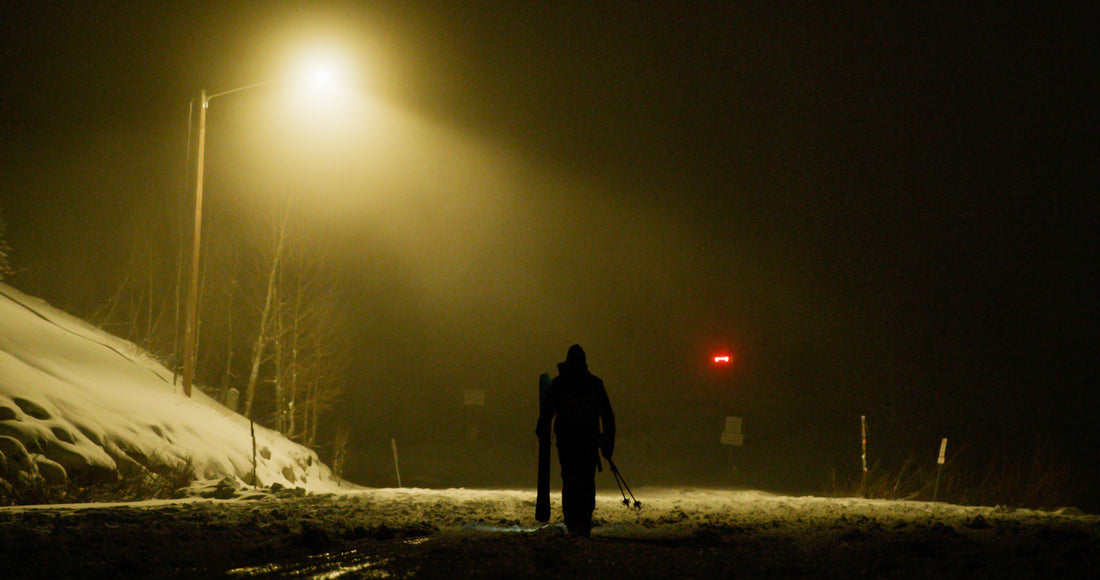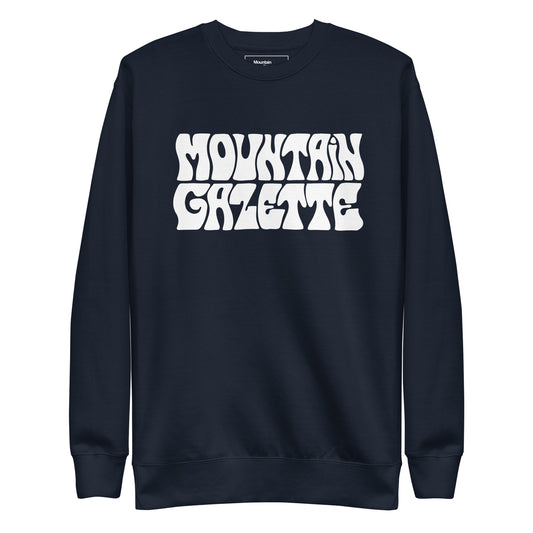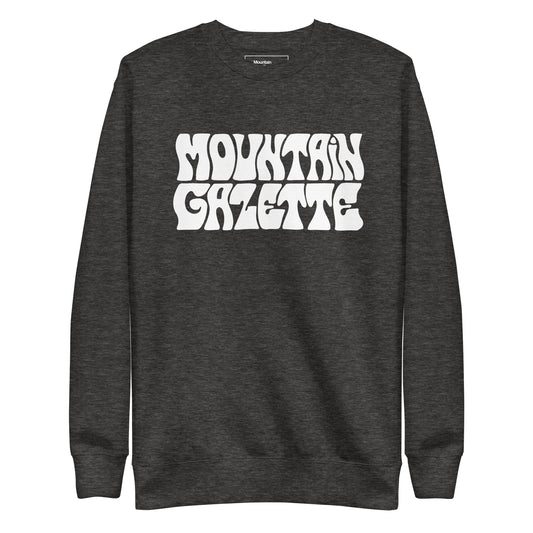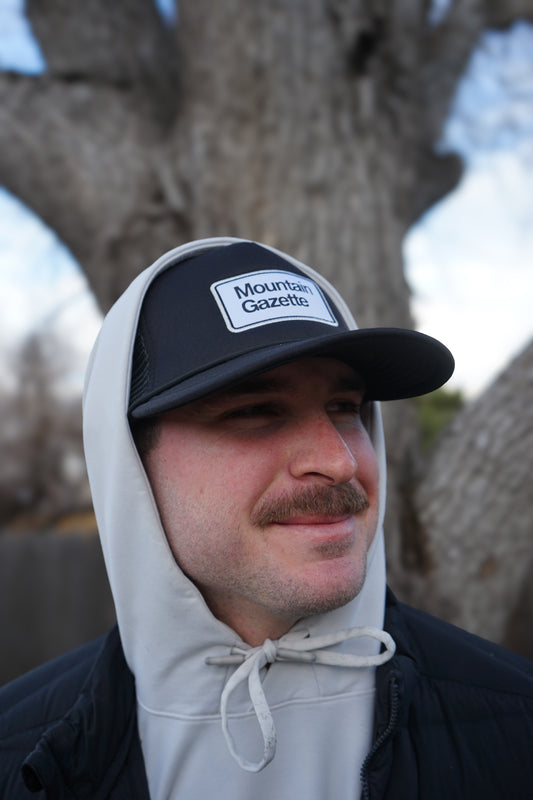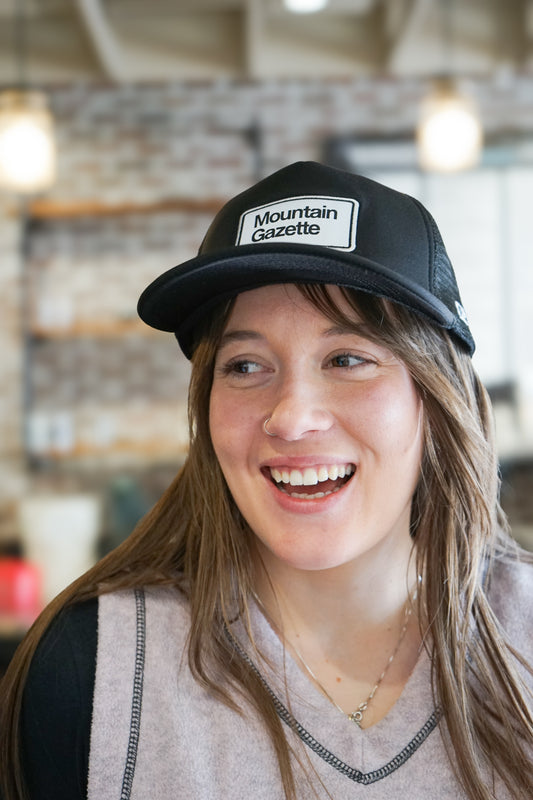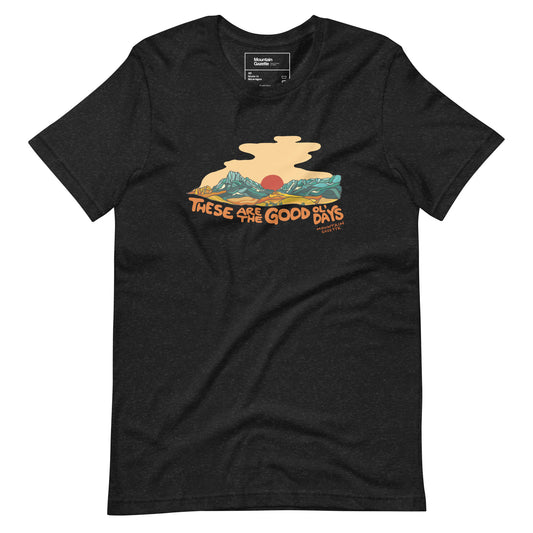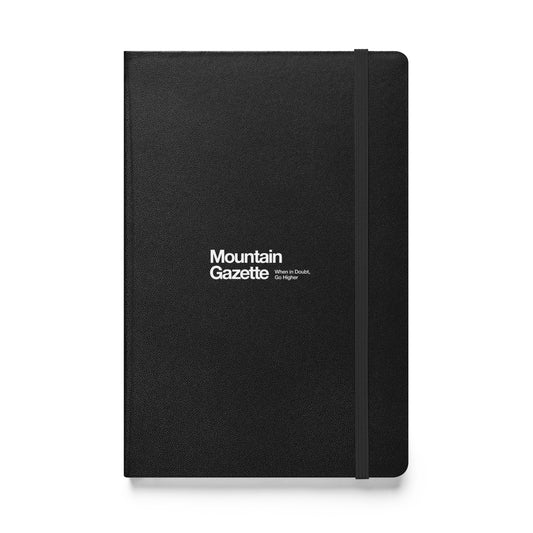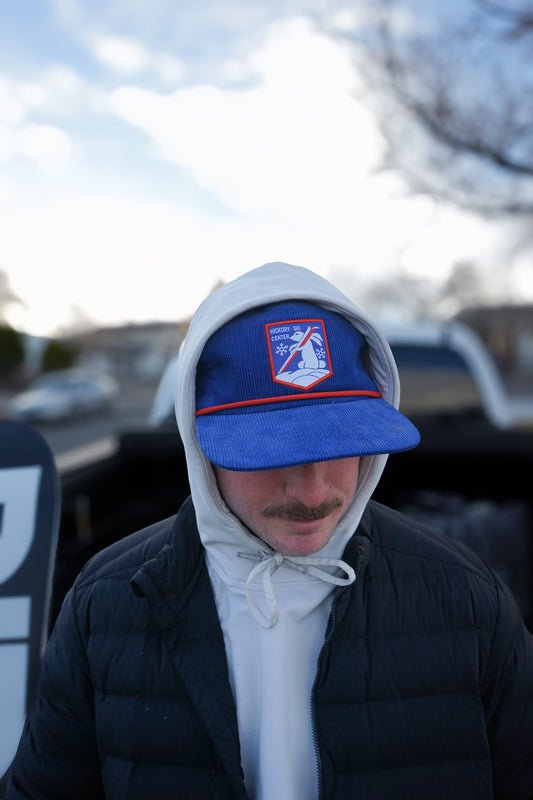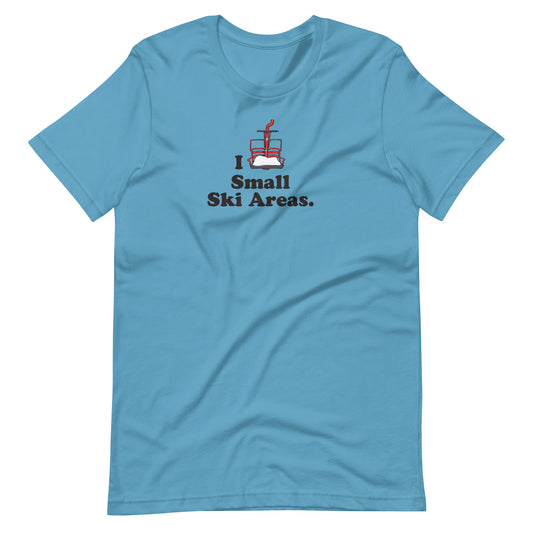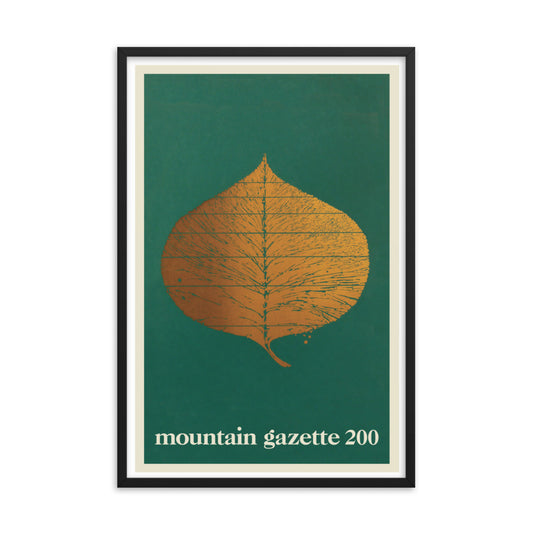Several months ago in the back of a sold out Tahoe Art Haus film screening I watched my friend, professional skier Drew Petersen, premiere a film that shook the audience to their core. In the film, which I implore you to watch before reading this interview, Drew lays it all on the line, a feat not uncommon in ski films, but unique in that he opens up about his struggles with mental health. At the end of the film, Drew received a standing ovation. He said a few things on-stage, answered a couple questions, then intro'd the next film. As he walked to the back of the theater we caught eyes and met in a huge embrace.
"I'm proud of you," I said.
"Thanks Rogge," he replied.
Standing there, hugging my friend, I felt a guilt that I didn't know what he'd been going through. I had no idea. And with that feeling still resonating months later, I decided Mountain Gazette needed to do something about it. We helped fund the rest of this film, because we believe in mental health at this magazine. We wanted to be able to share Ups & Downs not just today, but in future months and years to come because it's always a good time to remind folks they are not alone.
Drew is a subscriber to the magazine. I've said from the beginning Mountain Gazette is not my magazine, it's yours. It's Drew's. And this is a small part of us telling the stories of our subscribers, their highs and lows, Ups & Downs, because if I took one thing away from Drew's film it's that we have to be in this thing called life together.
Help begins by talking about it. For more resources on suicide prevention and mental health, please visit Drew's site: https://www.drew-
-Mike Rogge, editor
Mountain Gazette

WARNING: This interview includes candid conversations about suicide and mental health struggles.
Mike Rogge: There is this line in the beginning of the film where you talk about "going all the way" with suicide, going deep, almost as if that act is a peak to conquer. I'm wondering if you think that your approach to climbing a mountain was where you also where you were with your depression in that it wouldn't have been enough for you to have just depression, but you had to find the furthest way out there with suicide. Was the all-the-way mindset something that came out in the process of making this movie?
Drew Petersen: Well, actually, a line right after that is that it's all or nothing about everything. So, I wouldn't say that it came about because of the film but taking things extreme and all the way to a terminus or inflection point is a part of me. And it was also part of my depression was wanting to feel all the way to the extreme.
I can't fully explain this publicly because I don't want somebody to think that this is the route, but I'd almost relish those moments of contemplating, because it felt like I was getting a very full experience of life to feel something so extreme, even though it's something so extreme on the bad level whereas what I experience with skiing is always something all the way to the extreme on the feel-good level.
Mike Rogge: One of my takeaways from the first time I watched the film was that I didn't understand, having known you for a few years, how you were assuming that suicide would've been, the term you use, the conclusion, the peak, there we go, we're done. When I was thinking those thoughts at the Tahoe Art Haus premiere you were on stage speaking publicly about these feelings in front of a lot of people and you did that night-after-night on a ski film tour and now you're going to be doing it online with the release of Ups & Downs.
At any point during this time in your life did you think that instead of suicide that maybe this film could be the logical conclusion? There was this alternative, where, whether you like it or not, you're a public figure, you're going to be a face and an advocate for this issue for most of your career if not the rest of your career. Had you ever thought about this outcome in those dark moments? Because I must imagine it's hard to think in those dark times, "Oh this could be advantageous for me but this is a much better outcome than the alternative."
Drew Petersen: This outcome [of sharing the film] is honestly part of what got me through. I knew super early on that I would want to share this publicly and that I would want to share this with the people around me. And it took several years to get to a point where I'm able to. But even early on I think it's somewhat out of my nature of telling stories and through skiing, a lot of my life is already public. So there's certainly that avenue, but it became clear very early on that there wasn't a lot of help. There weren't a lot of resources and there weren't a lot of ways to feel seen and connected for people like me, for people who were that depressed. And I knew…
Mike Rogge: There aren’t a lot of public figures to relate to on this issue, no?
Drew Petersen: No. Not necessarily public figures, just anyone. And I realized at the time it was if I survived this then I could be that for other people. And as it got into the end stages, it became when I survive this I'll be able to help other people and I'll be able to be that resource that now I'm stepping into.
Mike Rogge: A big part of this story too, was the article you wrote over the summer for Outside. Do you think there is a conclusion with this film? Maybe the Outside story was the beginning, this film is the conclusion, or is it just the next step and are you hoping to do more in the future for mental health advocacy?
Drew Petersen: This film is just another step. It's just another domino in a greater mission to change this entire culture surrounding mental health.
Mike Rogge: It's one thing for people to discuss depression and suicide privately with friends and family, with therapists. Could you maybe tell me what it's like to do it on a tour in which the promotion of the tour was about fun and getting back together? Skiers were celebrating an ease in the pandemic. People were excited to get back in a theater and see ski films again on the big screen.
What is it like for you to do speak on this publicly on stage where the audience has now gotten to know you in the first maybe 20 to 30 minutes of the evening as this fun, bearded, blonde guy, who's up there hosting, introing fun films then to share your film? What was that like for you?
Drew Petersen: I'm at a point where it's not a big barrier and it's not a big divide that I have to cross to be able to talk about these things. And that includes in personal one-on-one conversation. And that also means publicly, like on the film tour and talking on a stage and being in front of hundreds of people. What I do think was unique about showing this film on tour and then actually being there in-person to go out on stage and talk to the audience or really talk with the audience, even though when you're on a microphone it's very one-sided.
It felt like a conversation because it was in-person. What I didn't expect from that was the magnitude of the emotions and the magnitude of the connection through getting to share that in person, because talking about this stuff publicly online is easy. What's going to happen? Somebody's going to troll me in the comments, big deal.
Mike Rogge: Has anyone trolled you?
Drew Petersen: I've gotten a couple things like, "Yo, I'm just here for skiing, unfollow." Like "So what?"
Mike Rogge: I think that's okay in the grand scheme of things.
Drew Petersen: I've been on the internet long enough that that stuff doesn't faze me whatsoever. But the vulnerability of sharing these things online and digitally is super easy. And then the vulnerability of sharing it in-person, while it's still easy for me at this point in my life, the magnitude of the response is so much greater on the film tour, getting to see people's faces and being able to talk with them afterwards and get hugs from big, burly, bearded men with tattoos and talk with kids it resonated with and have moms come up and thank me for doing this.
Mike Rogge: That's powerful.
Drew Petersen: That's what mattered the most about the film tour.
Mike Rogge: It feels like it's very in vogue today to talk about everything that's wrong about outdoor, everything that's wrong about skiing. And I know for some people skiing is a release, right? And it's their chance to forget about stuff. And for other people it's a way to channel their inner demons and put it into something positive. I'm wondering, and I'm not saying for you, I'm saying in general, do you think skiing can be a substitute for therapy? What do you believe that people get wrong about the power of skiing and what it can do for your mental health?
Drew Petersen: Skiing's super powerful. It's what I've shaped my life around and it is the one tool in my toolbox for my entire life to navigate these mental health issues. There are probably times when that kept me alive. So yes, it's an important way to take care of our mental health. But personally, I don't think that it should be an escape. And I don't think that it's a substitute for the other tools that we need in our toolkit, one of the greatest being therapy. Skiing isn't therapy. Skiing is a fulfilling, invigorating way to experience the outside world and enjoy yourself and bring some positivity into your life. But skiing alone isn't going to help you process trauma. It's not going to help you figure out how to be the best of you alone.
Mike Rogge: It's also seasonal.
Drew Petersen: Dude, that's actually a huge thing. I just had another interview, and we already talked a lot about this. The seasonal aspect of skiing I think is big for me personally too. These depressive episodes were always the worst in the summer or in the fall when I was going through injury cycles and when fall would come and skiing was on the horizon, but my body was in shambles. Those were some of the worst.
Mike Rogge: Recently we had dinner and you talked about running your first ultra-marathon. With ski touring there's type two fun...all of this is becoming a lot more popular. And in a way I've witnessed myself and other people using it as a form of self-mutilation. And I'm wondering if you see that, if you recognize that and what your thoughts are…
Drew Petersen: Well, I think that that's part of why skiing isn't a substitute for therapy and it's why sports in general, it's why for me in the summer ultra-running isn't a substitute for therapy is because we can take these things too far and we can take them to the extreme. And like you say with type two fun, if we're doing it just to feel something and that's something is either pain or a huge spike in adrenaline, then we have to have the awareness to come back to a middle ground so that we can appreciate going through those huge spikes, both highs and lows. And if we don't have other aspects of our life to help us gain that perspective, then that's when it just becomes an escape or another addiction.
Mike Rogge: One of the longer standing Powder editors, Neil Stebbins, told me every person who moves to San Clemente to work for the magazine should take up sailing or surfing, because they're probably bad at it and it's good to have that contrast in your life. What do you think today is providing contrast for you to help you gain that perspective of what therapy, what skiing, what this film release are doing to you? What's helping you process the highs and the lows right now?
Drew Petersen: The challenge of making this film is you can only pack so much story into 19 minutes. And what I wish there was more space to show is what my life is like now, because I've fully renovated my life in the past few years. And now it's built upon a foundation where skiing is just one brick of that foundation. It's not the be all end all. And I find a lot of fulfillment now in the summer running, but that's also just one brick.
It's not something that I use as a substitute for the rest of life. And now the toolkit that I have to keep me aware and grounded, to appreciate that middle ground includes everything from a meditation practice to a gratitude practice, cold dips in the river, continuing with therapy, sobriety, having meaningful lasting friendships and relationships based on quality conversation, not just built on skiing and partying.
Mike Rogge: For a lot of people who can relate to your story, it's going to be powerful. I have no doubt about it. That's why we/Mountain Gazette sponsored the film. What I am curious about are your thoughts for the people who are like, "I'm fine. I'm good." And they want to know why you felt you had to make this movie. What would you say to that part of the community? Because they're out there being like, "Dude, you're a great skier. Just stick to skiing.” You have fans. There may be people in the audience who are hoping to see a great Drew Petersen ski segment in the Blank movie or an episode of Salomon Freeski TV, they're maybe going to wonder why should they watch this film if they feel like they're fine and everything's all good? You alluded to the internet trolls before…
Drew Petersen: Yeah. If everything's fine and all good in your life and you have no mental health issues, first off, that sounds fucking awesome.
But look to the left and the right of you because there's people in your life, whether you know it or not, who struggle with their own mental health and for you to share, show up as a friend, as a family member, as a loved one for those people, it would do you well to watch the film just to understand a little of what it can be like on the other side. Before I made this film and before I started talking about these things publicly, I still felt like there was no one out there who understood these things and who felt this magnitude that I feel, but now after the essay and now the film, the number of people who really do understand this has blown my mind all the way to the suicidal part of my story.
Before I started talking about this stuff publicly, I would make these connections with people one on one where I felt like they understood me except for the suicidal piece. There's a lot of people who would be like, "Oh yeah, I've been there too." But it never felt like somebody knew what it was like to be staring at a box full of opioids at 2:00 AM just trying to figure out how to not take all of them and end it all. And now that I've released this film, I've seen that there are so many people that feel that. And so, to bring it back to your original question, after seeing how normal this is, if you don't feel these things, then there are people very close to you who do, who have in the past and who are impacted by these things.
Mike Rogge: Through making this film with [Sweetgrass Productions Director] Mike [Brown], has that brought your relationship closer? Because obviously you have to trust the filmmaker you're making this film with. When you're writing it's just you, but in this case, you and Mike had to be well connected.
Drew Petersen: I had to make this film with the right person and it ended up as me and Mike working on this together. And it was just a team of two because he and I see so genuinely on this level and there were other people who worked on this film as well, don't get me wrong, but as far as making decisions on telling this story, the reason he did it was because it's near and dear to him and while I'm not going to speak for him publicly, he understands.
Mike Rogge: It's got to feel good to make a project with someone that understands.
Drew Petersen: The space that he held for me to understand this aspect of me is massive. And the fact that he was able to hold that space for me shines through and how well he and I together told this story.
Mike Rogge: I have one final question for you. How are you doing?
Drew Petersen: I'm doing really well with the release of the film and I'm doing really well in life right now. I have a lot of moments where I just look out at the mountains and I'm really happy to be alive. And in that way I'm doing really well. But I definitely still struggle at times. And that's why I wanted to make it clear with this film that this journey continues for me. It's not like I've all figured out.
I've had a couple depressive episodes over the past couple months that have been tough, but I'm proud of myself for how I handle them now. I think it's been difficult to hold this space for other people, but I'm honored and I'm grateful that I have the opportunity to do so. And I really want to continue holding this space for other people because I know that having this space when I was earlier on in my journey would've helped me to get to where I am right now, where I just get to look at the mountains and be really happy to be alive.
For more resources on suicide prevention and mental health, please visit Drew's site: https://www.drew-

